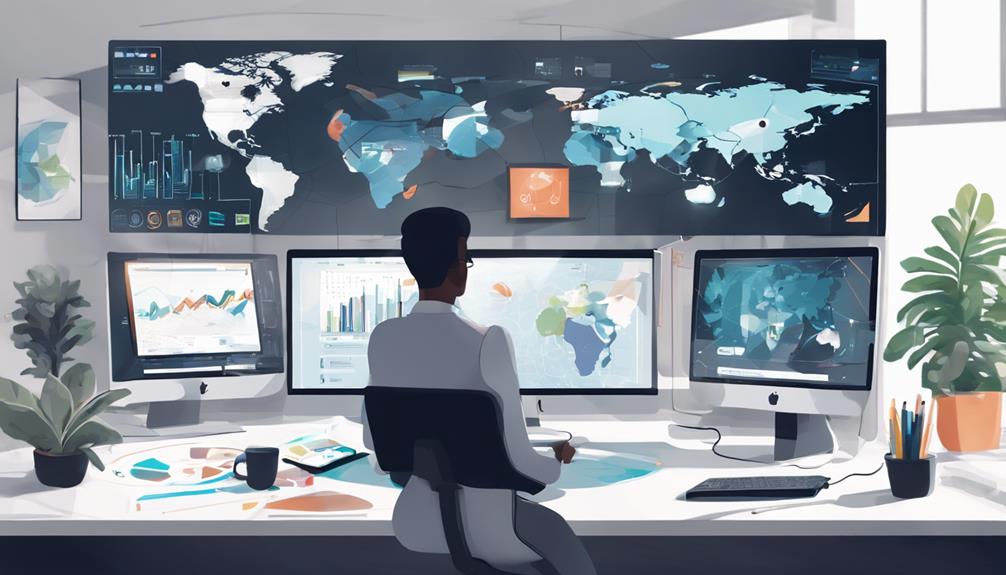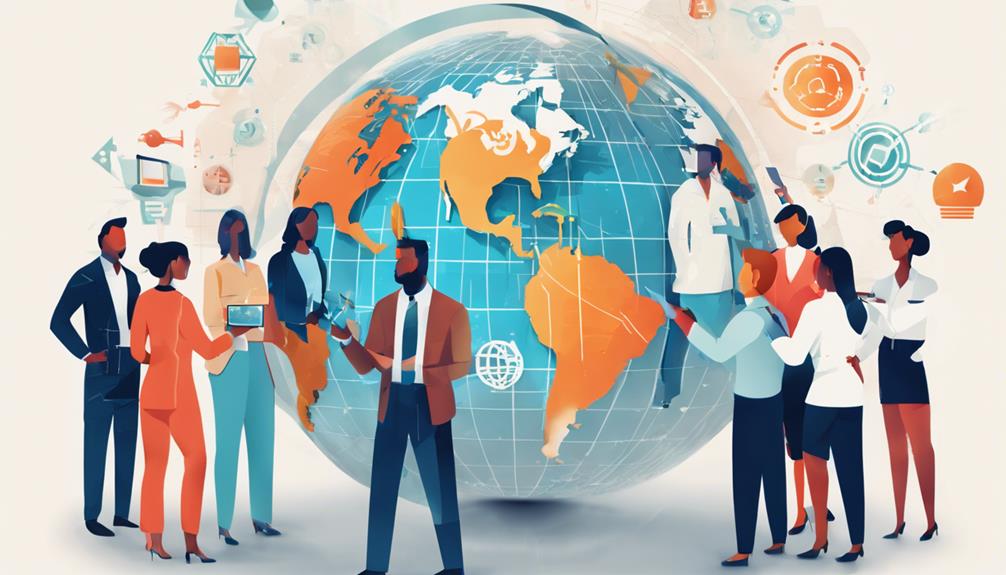
As you navigate the shifting landscapes of modern industries, you might find the insights from LinkedIn's thought leaders particularly enlightening. They've pinpointed trends that are not just shaping, but fundamentally transforming the way businesses operate. From the integration of AI in everyday business practices to the strategic emphasis on sustainability, these trends are setting the stage for a radically different marketplace. What's more, the evolution of remote work is not just a temporary shift but a long-term change in the global work culture. How will these shifts affect your industry, and are you prepared to adapt?
Analyzing Remote Work Evolution

Amid the sweeping changes in the global workplace, remote work has rapidly transitioned from a rare perk to a fundamental aspect of professional life. You've likely noticed how the traditional nine-to-five grind has been reshaped by the ability to work from virtually anywhere.
This shift isn't just about ditching your daily commute; it's fundamentally altering how you engage with your job, colleagues, and work-life balance. You now have the tools to work across time zones and collaborate with teams scattered around the globe.
Technology bridges the gap, with video calls and collaborative platforms becoming as routine as morning coffees. However, this new freedom comes with its own set of challenges. You're tasked with maintaining discipline and productivity without the structured environment of a physical office.
The boundary between work and home life blurs, making it crucial for you to set clear distinctions to prevent burnout. As companies continue to adapt, they're offering more support and resources to help you navigate this new landscape.
From virtual office hours to online team-building activities, the focus is on sustaining productivity and fostering a cohesive team dynamic, even when face-to-face interactions are limited.
Sustainability in Business Practices
As businesses embrace remote work, another significant shift focuses on integrating sustainability into their core strategies. You're seeing companies stepping up, not just because it's "good PR," but because sustainable practices drive innovation, cut costs, and create a positive brand image that attracts top talent and loyal customers.
You might notice how leaders in your industry are setting ambitious carbon neutrality goals or how startups are innovating by using sustainable materials from the get-go. They're not just following trends; they're setting them by embedding sustainability into their business models.
This isn't just about recycling or reducing waste — it's a holistic approach that considers everything from supply chain logistics to employee commuting patterns.
Moreover, you can't ignore the financial aspect. Investors are increasingly drawn to companies with strong sustainability credentials. They see these companies as better long-term bets with fewer regulatory risks and more potential for growth in a world that values green businesses more than ever before.
You should consider how your company can adapt these practices. It might start small, perhaps with switching to energy-efficient lighting or implementing a more robust recycling program, but every step counts.
The shift towards sustainable practices isn't just a trend; it's the future of business.
Technological Innovations Shaping Industries

With rapid advancements in technology, industries are undergoing transformative changes. You're seeing a landscape where digital tools aren't just additions but core components of business strategies. From retail to manufacturing, technology isn't just enhancing efficiency; it's redefining entire business models.
Take blockchain, for instance. It's revolutionizing supply chain management by offering you transparency like never before. You can now trace the lifecycle of a product, from raw materials to delivery, ensuring compliance and quality every step of the way. This isn't just improving trust but also streamlining operations and cutting down on costs.
In healthcare, telemedicine technologies are transforming patient care. You don't have to be in the waiting room for hours. Consultations, diagnostics, and follow-ups can all be done remotely, making healthcare more accessible and less time-consuming. This shift isn't just convenient; it's a lifeline for those in remote areas or with mobility challenges.
And in the energy sector, smart grid technologies are optimizing power distribution and usage, making systems more resilient and efficient. You're not just saving money; you're contributing to a more sustainable future.
These innovations are just the beginning. You're witnessing a revolution, and it's reshaping every industry you can think of.
The Rise of Artificial Intelligence
In the realm of artificial intelligence, you're experiencing a dramatic shift in how businesses operate and innovate. AI is no longer just a futuristic concept; it's here, reshaping every aspect of the corporate world.
You're seeing AI integrate into various sectors, automating tasks that were once manual, enhancing accuracy, and drastically cutting down on time and costs.
You're witnessing AI personalizing customer experiences in retail, predicting maintenance issues in manufacturing, and optimizing logistics in transportation. It's as if every industry has found a unique way to leverage this technology to its advantage.
Moreover, you're not just observing these changes from afar; they're impacting your daily interactions with technology, making them more intuitive and responsive.
The data handling capabilities of AI are particularly transformative. You're able to analyze vast amounts of information rapidly, leading to better decision-making and innovation.
This isn't just beneficial for large corporations; small businesses are also finding AI tools increasingly accessible.
As you continue to navigate this AI-driven landscape, it's clear that embracing this technology isn't just an option but a necessity to stay competitive and relevant in a rapidly evolving world.
Impact of Global Economic Shifts

Despite recent advancements in technology, global economic shifts are significantly altering the competitive landscape. You're witnessing how fluctuations in global markets, trade policies, and economic sanctions are reshaping the way businesses operate. Companies that once dominated are now facing fierce competition from emerging markets.
You need to stay agile, adapting your strategies to navigate these turbulent waters. As currencies fluctuate and trade agreements are renegotiated, your cost structures and supply chains might no longer be as advantageous as they once were. It's crucial you reassess your partnerships and production locations.
Look at how multinational companies are decentralizing their operations to hedge against political and economic uncertainties. You might need to consider similar strategies to protect your interests.
Moreover, the rise of economic nationalism is prompting a rethink of global expansion strategies. You're seeing a shift towards localizing operations and investments to align more closely with national interests, which could affect your market entry strategies.
Keep an eye on emerging economies that are now leveraging their competitive advantages more aggressively. They're not just low-cost centers but are climbing up the value chain. Adapting to these shifts isn't just beneficial—it's essential for your survival in the new global economy.
Diversity and Inclusion Strategies
Nearly every successful company recognizes the value of diversity and inclusion in driving innovation and reflecting the global market. If you're steering your organization toward these goals, you're not just opening doors to new perspectives; you're also harnessing the vast potential of a varied workforce.
Here's how you can start: Firstly, assess your current policies. Do they actively promote inclusivity? You'll need to revamp any practices that don't meet this criterion.
Next, provide training that enlightens your staff about unconscious biases. It's essential that everyone understands how these biases can affect decision-making and team dynamics.
Additionally, establish clear career pathways for underrepresented groups. Mentorship programs are particularly effective, as they connect junior employees with seasoned leaders who can guide and advocate for them.
Future of Healthcare Advancements

Healthcare is rapidly evolving, propelled by groundbreaking technological advancements and innovative treatment methods. You're witnessing a transformation that's not only reshaping patient care but also redefining the possibilities for medical professionals worldwide.
Imagine a world where your medical history and genetic information are seamlessly integrated into a personalized care plan, all accessible through wearable technology. You'll no longer just manage symptoms; you'll anticipate and prevent illnesses before they manifest.
AI-driven diagnostics are making this a reality, enabling faster, more accurate assessments than ever before.
Telemedicine is another area you'll see more prominently. It's breaking down geographical barriers, allowing you to consult with specialists across the globe without leaving your home. This isn't just convenient; it's a lifeline for those in remote or underserved regions.
You're also on the brink of more democratized healthcare. Innovations like CRISPR gene editing are poised to not only treat but potentially cure genetic diseases. Costs are dropping, access is expanding, and you're at the forefront of a healthcare revolution.
As you look to the future, stay informed and engaged. You're not just a passive recipient of healthcare. You're an active participant in its evolution.
Frequently Asked Questions
How Do Thought Leaders Balance Work and Personal Life?
You balance work and personal life by setting strict boundaries, prioritizing tasks, and ensuring you've time for relaxation and family. It's essential to disconnect fully to maintain both productivity and personal happiness.
What Daily Routines Enhance Thought Leaders' Productivity?
To enhance productivity, you should establish a morning routine, prioritize tasks, and take regular breaks. Staying organized and limiting distractions are key. Additionally, reflecting daily helps maintain focus and drive continuous improvement.
Can Thought Leadership Influence Regulatory Changes?
Yes, you can influence regulatory changes through thought leadership by presenting innovative ideas and credible insights that challenge the status quo and inspire stakeholders to reconsider existing policies and advocate for meaningful reform.
How Do Thought Leaders Protect Their Intellectual Property?
You can protect your intellectual property by registering copyrights and trademarks, securing patents, and using confidentiality agreements to safeguard your ideas when discussing them publicly or in professional settings.
What Hobbies Do Thought Leaders Recommend for Creativity?
You'll find thought leaders often recommend hobbies like painting, writing, or playing music to boost creativity. Engaging in these activities can spark new ideas and enhance your problem-solving skills in unexpected ways.
Conclusion
You've seen how LinkedIn thought leaders are shaping the discourse around future work and business trends. Embrace remote work's evolution and integrate sustainability into your core practices. Harness technological innovations, including AI, to stay ahead. As economic landscapes shift, prioritize diversity and inclusion to enrich your workplace culture. Don't overlook the transformative potential in healthcare advancements. By staying informed and adaptable, you ensure your business not only survives but thrives in these dynamic times.






